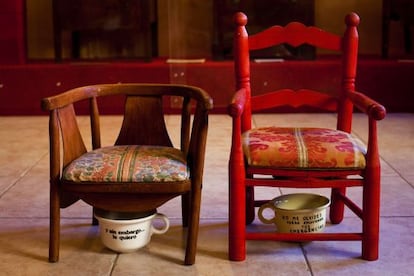A potted version of history
The chamber pot museum in Ciudad Rodrigo is a major attraction, receiving more visitors than the city cathedral


Henry Miller might spend weeks reading James Joyce here. “There are passages in Ulysses that can only be read in the toilet, if you want to suck all the flavor out of them, ” the novelist once said, paying tribute to literature and physiology at once.
In this museum, beside the cathedral of Ciudad Rodrigo, in Salamanca province, he could have read each page of Ulysses on a different chamber pot, with plenty left over for re-reading. And in different styles: Victorian, solid silver, Chinese, miniature-painted, Polish ceramic, rocking-chair, and the French dompedro, which renounces the circle for the ovaloid of the bidet.
“The French have always, always been odd,” says Seville native Juan Carlos Rivas García as he tours the rooms of the Museo del Orinal (or Urinal museum) together with his uncle Abel Sánchez. One exclamation follows another.
“Hey, a chamber pot about the [1981] coup!”
In front of him, a little stand displays a white chamber pot adorned with an order that must have loosened the bowels of some of those who heard it.
“¡Se sienten! (Sit down!)” it reads. These were the words Civil Guard colonel Antonio Tejero reportedly shouted to members of Spanish Congress during his attempted coup d’etat on February 23, 1981.
This pot is one of 1,200 pieces on display in this museum, all made for receiving urine and “night-soil.” They come from 27 countries and date back to the 12th century.
Some of them look like gravy boats, while others bear joke messages: “I can see your thing!” or “Concert Hall.” Some provide warnings, such as one from the Central Pacific Railway: “Do not empty this pot out the window.”
The warning “¡agua va!” used to be commonly heard in Spanish streets when someone was about to empty a chamber pot out a window. One English equivalent was “Gardy-loo,” from the French gardez l’eau (look out for the water) when towns still had open sewers running down the streets in pre-plumbing times.
Who would think of assembling such a collection of chamber pots (or commodes, urinals, potties, honey bowls, thunder mugs or other pet names) and putting them on display in this town of fine old architecture? José María del Arco Ortiz, alias Pesetos, is, as far as is known, the only Spanish collector of chamber pots, other than the late Nobel Prize-winning writer Camilo José Cela, who had about 70 of them.
In 1982, he saved a number of old chamber pots from destruction from a centuries-old hospital that was being renovated. Thus began the collection, well nourished with British pieces thanks to his wife Pamela Williams.
These include an Edwardian mahogany dompedro, a piece of furniture designed to hide its function. It looks like a rather splendid, even kingly, chair until, moved by the urge, you lift a cushion or hinged seat and reveal the unmistakable orifice.
“It was given this name after Peter I, the Cruel,” explains Jenaro Hernández, the curator of this museum, which is subsidized by the municipality and receives more visits than the neighboring cathedral — between 25,000 and 30,000 a year, according to Adoración Cañamero, Ciudad Rodrigo’s councilor for tourism and museums.
Alas, the museum lacks some of the most historic pots that many would be curious to see, including the one that belonged to Shakespeare’s father, who was fined for the excessive filth of his latrine. Or one of the lesser-known inventions of Leonardo da Vinci, who contrived a system of pulleys so that, when he sat down on the Throne of Shame, the bathroom windows opened automatically, to let in heaven’s soft delicious air. Genius at the service of the banal.
Tu suscripción se está usando en otro dispositivo
¿Quieres añadir otro usuario a tu suscripción?
Si continúas leyendo en este dispositivo, no se podrá leer en el otro.
FlechaTu suscripción se está usando en otro dispositivo y solo puedes acceder a EL PAÍS desde un dispositivo a la vez.
Si quieres compartir tu cuenta, cambia tu suscripción a la modalidad Premium, así podrás añadir otro usuario. Cada uno accederá con su propia cuenta de email, lo que os permitirá personalizar vuestra experiencia en EL PAÍS.
¿Tienes una suscripción de empresa? Accede aquí para contratar más cuentas.
En el caso de no saber quién está usando tu cuenta, te recomendamos cambiar tu contraseña aquí.
Si decides continuar compartiendo tu cuenta, este mensaje se mostrará en tu dispositivo y en el de la otra persona que está usando tu cuenta de forma indefinida, afectando a tu experiencia de lectura. Puedes consultar aquí los términos y condiciones de la suscripción digital.








































